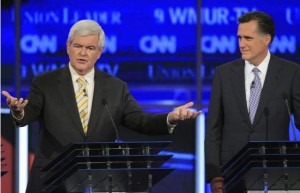Mitt Romney has won a major victory in New Hampshire. He is the first non-incumbent Republican to capture both Iowa and the Granite State — a historic achievement. He has the money, momentum, organization and — perhaps most importantly — the air of inevitability going into South Carolina. Barring an unexpected development, the former Massachusetts governor is poised to be the Republican presidential nominee. Mr. Romney will likely be the man destiny has chosen to challenge President Obama.
This is unacceptable to some of his GOP rivals. They are now waging a scorched-earth campaign to derail his nomination. The thrust of their arguments against him resemble those of the progressive left: anti-capitalist. Mr. Romney surely anticipated such attacks from Obama Democrats, but not supposed conservative Republicans. Former House Speaker Newt Gingrich, Texas Gov. Rick Perry and former Utah Gov. Jon Huntsman Jr. all are claiming that Mr. Romney’s tenure at Bain Capital, a private-equity firm, make him unfit to be the Republican standard-bearer.

Their argument can be distilled to one seminal charge: Mr. Romney is a modern-day Gordon Gekko, a ruthless corporate marauder who made millions plundering companies and gaining profit from the misery of laid-off workers. Mr. Perry claims that Mr. Romney was not a venture capitalist; rather, he was a “vulture capitalist” who left “carcasses behind” and “picked the bones” of troubled companies — especially in hard-hit South Carolina, where the Texas governor is championing economic populism. Mr. Gingrich says Mr. Romney “looted” firms that resulted in bankruptcies, mass layoffs and economic devastation.
“If somebody comes in, takes all the money out of your company and then leaves you bankrupt while they go off with millions, that’s not traditional capitalism,” Mr. Gingrich said.
These attacks are signs of desperation. Oddly, however, they are also recycling the very same arguments used by Sen. Ted Kennedy in his 1994 race against Mr. Romney. Kennedy held his Senate seat and crushed Mr. Romney by a 17-point margin. The Massachusetts liberal lion played the familiar anti-business, class-envy card. He falsely portrayed Mr. Romney as a gangster capitalist whose actions hurt middle- and working-class citizens.
The Kennedy-Gingrich-Perry doctrine does not understand free-market capitalism. At its core is what economist Joseph Schumpeter called “creative destruction.” Schumpeter rightly understood that the system of free enterprise unleashes constant economic change and social upheaval. This is the inevitable result of capitalist dynamism, wealth creation and technological innovation. Contrary to myth, liberalism is not a “progressive” creed. Instead, it is the very opposite: reactionary. This is why liberals defend the ossified and bankrupt status quo — Social Security, Medicare, food stamps, agricultural subsidies, public education, labor unions, General Motors and Amtrak. They don’t understand the creative nature of capitalism; they deeply fear the destruction it causes at the same time. They prefer to cling to the antiquated past.
Mr. Romney has nothing to be ashamed of. Private-equity firms, such as Bain, perform an essential social function: connecting investment resources with entrepreneurial opportunities. Mr. Romney helped to take over badly run companies that were on their way to bankruptcy. He turned many of them around, shedding dead weight and excessive fat, making them more efficient, productive and, yes, profitable. Some failed; others succeeded. Overall, however, he saved numerous corporations and generated considerable wealth and more than 100,000 net jobs. This is not “vulture capitalism.” It is free enterprise — in the real world, not in some think tank or Washington policy conference.
Mr. Romney now has a unique opportunity: to make the case for capitalism as the historic basis for America’s exceptionalism. The rap against him is that he is a corporate technocrat, a pragmatist enamored with data and analytical models who lacks a coherent, inspiring vision. By contrasting the virtues of economic freedom and market-driven growth against Mr. Obama’s entitlement society, Mr. Romney can turn the election into a stark, decisive choice: Follow Europe down the disastrous road of statism and bankruptcy or return to the American system of private enterprise, self-reliance and unprecedented prosperity.
The fact that leading Republican candidates are resorting to class warfare and capitalist bashing shows that welfare liberalism has made deep inroads into the party. Since the Reagan era, the GOP has been defined by three pillars: economic conservatism, cultural traditionalism and muscular internationalism. These edifices are now eroding. Rep. Ron Paul’s continued strong showing embodies the rise of anti-war libertarianism. Former Sen. Rick Santorum’s surprising strength reveals that big-government conservatism has a base within the party. When one sees Mr. Paul and Mr. Santorum on the same stage, it is obvious they have little in common. They might as well be from two different political parties.
Capitalism, however, is the glue that has fused the GOP’s diverse wings. By assaulting it, Mr. Gingrich and Mr. Perry are not just striking at Mr. Romney’s very core. Without broad agreement on the role of capitalism, the entire Republican structure may come crashing down. If GOP rivals are going to spend their time denouncing the alleged evils of free enterprise and the profit motive, then who needs the left? The Republican grass roots can be forgiven for feeling demoralized and disillusioned. Mr. Romney has real weaknesses — taxes, spending, Romneycare and flip-flops on abortion and gun rights — but being a successful venture capitalist is not one of them. Reagan must be turning in his grave.
Jeffrey T. Kuhner is a radio talk show personality and a columnist at The Washington Times and WorldTribune.com.


You must be logged in to post a comment Login